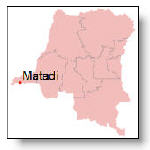At least 35 people have been killed in clashes between security forces and opposition supporters protesting against the results of governorship polls in Congo's western-most province. The violence appeared to be the worst since President Joseph Kabila won last year's presidential election. Joe Bavier is in Kinshasa and has more for VOA.
The violence began Wednesday night when police raided the home of the opposition candidate for vice-governor, Ne Muanda Nsemi, in Matadi, the capital of the province of Bas-Congo. Nsemi is the spiritual leader of Bundu dia Kongo, an anti-government ethnic-based political and religious movement.

Democratic Republic of Congo
Clashes continued through the night in Matadi, before spreading to Boma and Moanda, two other cities in Bas-Congo, Thursday.
Supporters of Nsemi and gubernatorial candidate Leonard Fuka Unzola clashed with armed police and soldiers after taking to the streets to protest against the results of governors' elections last Saturday won mostly by candidates allied with newly inaugurated President Joseph Kabila.
Nsemi and Unzola, members of defeated presidential candidate Jean-Pierre Bemba's Union of the Nation, U.N., political coalition, have filed a lawsuit denouncing the election outcome and calling for a second round poll to be held.
Mr. Kabila defeated Bemba, in what were the first free elections held in more than 40 years in the vast, former Belgian colony. The polls were intended to draw a line under a 1998 to 2003 war that killed an estimated four million Congolese, mainly from hunger and disease.
Hospital workers in Boma told VOA that 25 people including police were killed in the fighting.
United Nations' supported Radio Okapi quoted the mayor of Matadi as saying 12 people had been killed in Matadi. And more deaths were reported from Moanda on the Atlantic coast.
But reports of casualties were confused and officials from the U.N. peacekeeping force in Congo said it was too early to give a definitive death toll.
Interior Minister General Denis Kalume traveled to the province to direct efforts to control the violence.
The violence followed a verbal attack by Bemba on Kabila last week.
Bemba accused the president's Alliance of the Presidential Majority, AMP, of buying the votes of provincial assembly members to win a majority of Senate seats and governor's posts.
The AMP won seven of the nine governorships up for grabs, while Bemba's coalition won only one, in his home province of Equateur. The U.N. failed to win the governorships of Kinshasa and Bas-Congo, where Bemba has a popular following.
AMP officials have denied the corruption and vote-buying allegations, blaming a lack of cohesion within the U.N. for its failures in the Senate and governors' polls.
Mr. Kabila's allies also dominate the national parliament where they have used their majority to seize control of important commissions.
During last year's presidential and legislative elections, soldiers loyal to Bemba clashed with Mr. Kabila's presidential guard in street battles in the capital Kinshasa that killed dozens.
Related articles
- • Felix Tshisekedi Sworn In as DR Congo President (January 24, 2019)
- • Constitutional Court Declares Tshisekedi Winner of Presidential Election (January 19, 2019)
- • Felix Tshisekedi Vows to Be the President of All Congolese (January 10, 2019)
- • Felix Tshisekedi Elected DR Congo President (January 10, 2019)
- • DR Congo Delays Results of December Election (January 6, 2019)
- • Jean-Pierre Bemba Returns to DR Congo (August 1, 2018)
- • At least 30 dead after massacres in Ituri (March 2, 2018)
- • Botswana Urges Joseph Kabila to Step Down (February 26, 2018)
- • No elections in DR Congo in December without electronic voting machines: INEC (February 13, 2018)
- • US Warns DR Congo Against Electronic Voting for Delayed Election (February 12, 2018)
- • Felix Tshisekedi accuses INEC of illegally prolonging Kabila's mandate (October 24, 2017)
- • DRC Seeks Arrest of Presidential Candidate Moise Katumbi (May 19, 2016)
- • Papa Wemba Is Buried in Kinshasa (May 4, 2016)
- • Papa Wemba Awarded Highest National Honor as Thousands Pay Tribute (May 2, 2016)
- • DR Congo reach final of African Nations Championship (February 3, 2016)
- • Political tensions 'running high' in DR Congo ahead of 2016 elections (October 7, 2015)
- • Rights Groups: DR Congo Must Free Pro-democracy Activists (April 13, 2015)
- • Police Open Fire on Crowd Protesting Election Law Change (January 19, 2015)
- • DR Congo: The country that knows how to beat Ebola (December 11, 2014)
- • Ebola Epidemic Resurfaces in DR Congo's Equateur Province (August 25, 2014)
- • Etienne Tshisekedi Evacuated to Belgium for Medical Treatment (August 16, 2014)
- • 15 dead in football match stampede in Kinshasa (May 12, 2014)
- • Kerry Calls on Kabila to Honor Constitution (May 4, 2014)
- • Kerry in DR Congo for Security Talks (May 3, 2014)
- • Security Council extends UN mission, intervention force in DR Congo for one year (March 28, 2014)
- • Death toll in Lake Albert boat accident rises to 108 people (March 24, 2014)
- • DR Congo Takes Chairmanship of COMESA at Summit in Kinshasa (February 26, 2014)
- • DR Congo Honors Nelson Mandela, Hero and Model for Humanity (December 6, 2013)
- • Kabila Congratulates Congo Army for Defeating M23 Rebels (October 30, 2013)
- • M23 Rebels Kill, Rape Civilians in Eastern Congo: Human Rights Watch (July 22, 2013)
Tags: |







